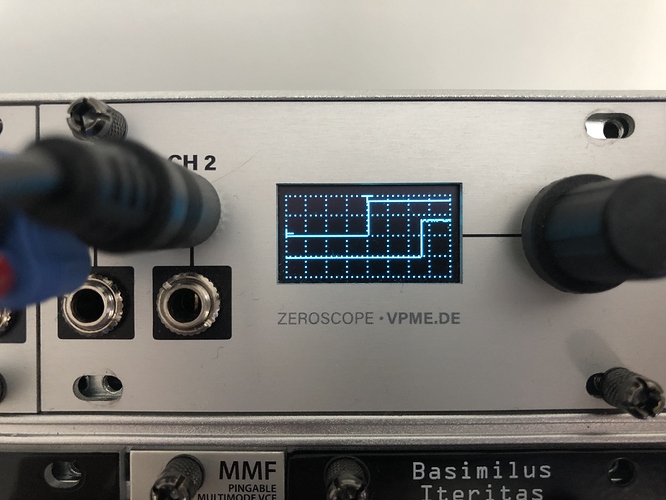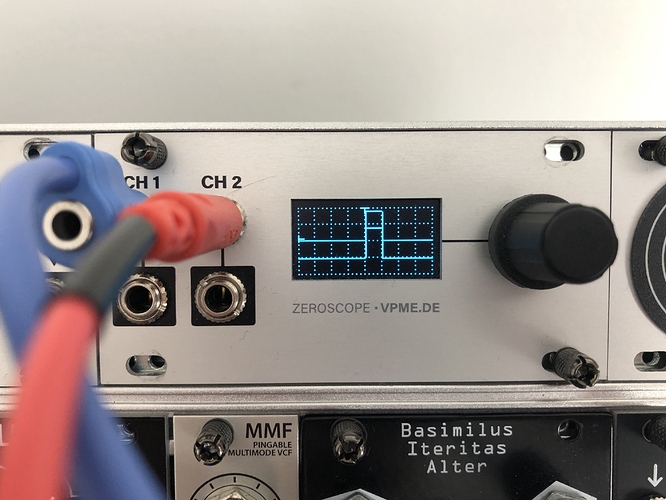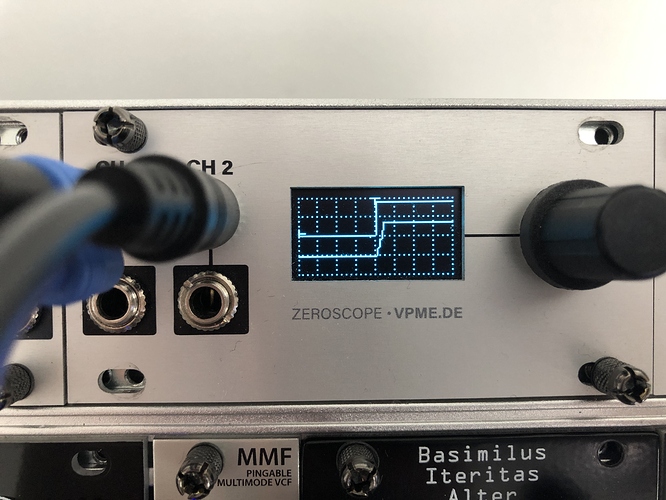Hi there loving the Hermod thus far! I originally got the hermod so I could take pitch from my harmonaig (4 part eurorack quantizer) and send that pitch data to the midi/usb outs. I have tried everything and i cant figure out how to set up cv>midi pitch translation. Is anyone having luck with that?
Bump? Anyone? I find it hard to believe that no one else is trying to use this thing for cv > midi for pitch?
It’s in settings, CV input settings https://squarp.net/hermod_settings
But it’s unreliable at the moment, even with pre quantized signals… (solved soon)
Hi EarthCry,
I was trying the same yesterday. using pitch and cv out from my Metropolis Sequencer into CV inputs A and B. I was using an empty track with in track settings the CV source configured : CV/gate AB.
Tried differend CV-ranges, and quantize on /off but not a good result. I did get midi notes but not sometimes wrong notes and double notes.
Add the midi out effect on an empty track that has cv / gate in on a&b / c&d.
I did that and the notes are played on the midi device ( JD_990 synth ) but sound off tune.
I still are investigating, maybe I did forget something, or it is a bit buggy
I tried this today with midi out to a monomachine - was perfect. Try turning Quantizer Note with in Settings > CV In to On (Gate).
Does that fix it?
No, this didn’t help me.
Changing:
Settings > CV in > CV in range
to -5V to +5V did make the tracking better. Despite the manual saying this setting is only for modulation signals, it does seem to affect pitch CV, too. “0V to 5V” results in a scaling of the pitch CV so that semitones become tones.
But pitch CVs are typically 0V to 10V, so the range is truncated to 0V to 5V. I got CV to MIDI working for a 1 octave range (not a very useful octave!). Mmm, so can I offset incoming CVs by -5V to get into Hermod’s -5V to +5V range. Kind of. Then other weirdness sets in.
MIDI garbage must be getting sent out, both because listening to some of the weird stuff suggests so, and because the destination MIDI instrument keeps crashing (MAM MB33, then Mother-32 which I tried to make sure it wasn’t just the MB33).
I’ve been around in circles for 3 hours. I’m giving up. This is something I really hope Squarp sorts out, it’s a major feature isn’t it? I would certainly love to use the Metropolis to sequence MIDI gear …
Hi, is this sorted out, yet?
I haven’t got a Hermod, yet, but good CV to MIDI would be the main reason for me to choose it over other sequencers.
Part of the problem with doing this (in general), is that Euro sequencers typically send the gate and then change the CV value. If they do it the other way round then the DAC hasn’t caught up by the time the gate comes. I have been trying to use a Doepfer A192-2 for this.
Most (quantised) euro sequencers seem to have this issue.
Sequencers that I own with this issue are, Metropolis, Varigate 4+, Rene (Classic) and BSP.
I typically use EOR from channel 1 of Maths as a trigger delay 
If there was an option to dial in a delay for reading the CV value, then Hermod could get the values right. This would cause a slight latency while it is doing this, but because Hermod knows where the gate actually came in, it wouldn’t need to have the latency when the recorded sequence is played back.
This would also be useful for compensating for external quantisers.
@Marizu No, this hasn’t been sorted out yet. I’ve been struggling with the same things lately. I really like your idea of delaying the input gate internally in the Hermod, since it can be smart enough to then compensate it in the actual recording. This would make Hermod a huge value to me.
Sadly I never got comfortable with making/editing sequences directly on the Hermod. The interface of buttons + encoder + the small screen seem to frustrate me too much. But I thought I had a eureka moment today when I started recording the output of my Metropolis with the cv inputs of the Hermod. I got really excited but then I ran into the issues described above. 
The metropolis is outputting a very stable pitch, but once it goes in the Hermod, things get wobbly. Without note quantization on the input it sounds kind of ok, but then you can’t record the notes because the noise will show up as glitches in the sequence.
If I turn on note quantization on the cv in, the noise is causing random variations. I really hope the Hermod is equiped with good enough quality ADCs and they can sort this issue out.
@squarpadmin This also made me think of a useful feature for Hermod. If it allowed you to just record the cv/gate inputs as-is (without converting to midi notes), you would be able to record sequences with glide in them as well. So basically extend the modulation recording functionality to also include gates. Then you loose the ability to use some midi note fx on the recorded pattern, but I think being able to record and play back the cv/gate input without modification would be super useful.
When playing live with cv input recording I also found a bug.
- (not sure if related) hermod in sync slave mode
- (not sure if related) set cv/gate input to record on active channel
- (not sure if related) set cv/gate quantize on
- go to track mode
- select track 1
- push encoder -> clear track (just to initialize everything)
- start clocks/hermod and run external sequence into input
- go to step mode
- hold y and press rec (to turn on hard REC)
- press rec again to stop the recording (now the recorded pattern is playing back)
- go to track mode
- toggle the track enable button a few times.
- … silence
The only way I found to fix this silence is to clear the track.
I guess I will make an official bug report for this.
I’m trying (again) to use Hermod as a CV to Midi converter.
CV/ gate on input A/B. But after a few seconds one note get stuck, then two and three… I think sometimes the corresponding “note off” is never sent. Very disappointing.
Do you have the same issue ?
I’m using this and it’s working perfectly for me. Here’s the set up…
Marbles > Hermod AB (Quantize set to Gate ON) > USB Device > Bitwig > Digitone.
Instant melodies!
Kid Yo
I’ve returned to this with an updated Eurorack set up and alas, I’m having problems. Here’s my set up…
I have my Hermod connected to a Bitbox Micro via Midi.
I have a series of gates on Track 1 - these act as my triggers. I have an LFO going into CV A and the Track 1 triggers into CV B. Quantize is set to On(Gate) in Hermod’s settings. Essentially a sample and hold to generate notes. This is then used via the Mod Matrix to adjust the Transpose parameter in the Scale effect.
I have a Midi Out effect on Track 1 which is sent to the Bitbox Micro which is set to receive notes.
Everything works, however I’ll get multiple notes being sent sometimes when only 1 should be sent. It sort of sounds like when you play a piano and you accidentally hit the key next to the intended key, before then playing the intended key. This seems to happen 10% of the time?
My guess is the timing of the midi note being sent is not always the same as the sample and hold.
Here’s a video - you can hear it best at around 10 seconds - there are 2 in a row.
So I’ve been digging into my problem and have found a solution, but also another issue…
Here’s what I’ve noticed - there is a delay running anything through the Hermod.
Example:
- I send CV & Gates from Track 1 into CV In A/B.
- Track 2 is set to sample & hold CV In A/B (via Settings).
- Track 2 is set to Note and is sending out to Midi.
The good news, it does send clean notes and there are no double notes - great - previous problem solved - though what I’m now doing isn’t quite the same as before (ie: I am not modulating an effect parameter).
However, the gates coming out of Track 2 are not in time with the triggers being sent from Track 1 (or any other Track in Hermod). They’re out by 5-10ms (I’m unable to measure precisely with the Zeroscope). This has to be because they’re running through the CV inputs and back out again.
This is ok for slow attack type sounds, but not good when you need sounds to be in sync like drums or any hard attacking sound. As it sounds, the mis-alignment with other tracks coming from Hermod is audible.
I get it, the signal needs to be processed by the Hermod and there is inherent latency in that processing… but I wonder if there is suitable workaround?
Ooof!
Great that you are trying to get to the root of the problem!
I would really love to use Hermod for CV/pitch to Midi, and maybe even with a Bitbox Micro, like you.
As it is now, I might go for the new Befaco module which seems more straight forward for this kind of task.
Keep us posted if you make any progress!
@KidYoshi does this still work for you with Marbles?
I used to do this quite a bit, but honestly it was always with Marble, and it seemed to work absolutely fine.
my assumption (and its only that, as we have to access to the source code), is that the CV pitch is read when the gate comes in (so its a S&H) - that would seem like the logical way to do it.
if we are missing notes off… then perhaps the issue is its not holding that value during the gate - so note off, is resampling the cv input, if that’s changed then the note_off would not match (that’d be a bug imho).
(a changing cv value whilst the gate is high, should only change pitch-bend)
but that’s a lot of assumptions… really someone would need to do some testing to prove this is the case, or be able to illustrate the issue better.
btw: i seem to remember reading (possibly Emile of MI?) that gates are usually slightly delayed when sent by eurorack sequencer modules … - to allow for the CV to ‘settle’.
Has anyone reported this to Squarp via contact form
https:/squarp.net/contact
Sounds like difficulty here is coming up with a test scenario for Squarp that does not rely upon other modules.
Has anyone tried to see if they can create the same problem using just the hermod?
e.g.
MIDI -> hermod (track 1) -> T1 cv/g
hermod T1 cv/g -> hermod cv a/b -> Track 2
Track 2 -> MIDI
ie. we do midi -> hermod (midi -> cv -> cv -> midi) -> midi
if this produced the issue - then this would be easy for Squarp to replicate.
@thetechnobear - here are my thoughts around my recent posts and conclusions after more experiments.
S1: Changing existing sequence note values via Mod Matrix: Scale: Transposition and sending values out via CV
You will get multiple notes if the modulation into the Mod Matrix is not synced exactly with the resulting gates being sent out to the receiving audio module. For example a sine wave as modulation source vs. a synced sample & hold sine wave. This can be solved by going into the Midi In effect and turning off Gate Retrig. Any notes being sent out will be in sync with the rest of Hermod.
S2: Changing existing sequence note values via Mod Matrix: Scale: Transposition and sending values out via Midi
I’ve not been successful with this as there is no way to sample & hold modulation going into the Hermod that is exactly in time with the midi notes being sent to the target midi device. I was using the gates that are going out of the track that the sequence (and Midi Out effect is on). Gate Retrig makes no difference here, any changes to the transposition effect immediately send out a new midi note. So what I think is happening is the Midi Notes out are not in sync with the Track Gate notes out which are being used as the means to sample & hold. On top of this as it never seems consistent, I assume jitter makes things even more unpredictable.
S3: Creating a sequence from pure modulation via CV In A/B with Settings: CV In: Track 1 set to CV A/B and Settings: CV In: Quantize Note set to: On (Gate) and sending values out via CV or Midi
In this instance there is no existing sequence and one is generated by CV and Gates being sent to the CV Ins. So you could send Marble’s CV and Gate outputs, sample them via Hermod’s CV inputs and send them onwards via CV or Midi (via Midi Out effect). This works as expected and is what I refer to way up above in Feb 2019. However: what I didn’t realize then which I do now is that there is a latency to this process which means your notes & gates will be slightly delayed versus everything else from Hermod and probably the rest of your set up.
It’s easy to test this. The photo below is from the following set up: I sent Hermod’s Clock into a scope (top) and also multed it to CV B. CV B is set to pass on those triggers on to Track 1 (as described in scenario 3 above). Those gates are also put into the scope (bottom). The window of time being displayed is 10ms. It looks like Hermod adds around 3.5/4ms of latency.
This is audible: I recorded an example of the same drum hit doubled up onto two tracks in Bitbox. They’re both being triggered by the clock. One directly and the other via Hermod’s CV Input (CV B). The first 8 is just the clock, the second 8 is the clock and the clock via the CV input together. You can really hear it.
I decided to do a comparison so set up the same process but with an Intellijel Scales. Again the window of time in this photo is 10ms. It’s much tighter but of course Scales does not let you send CV on to a Midi device unlike Hermod.
Bottom line, Hermod can sample incoming CV and send it onwards (via CV or Midi) clean and as expected if you have everything set up as per S3. However it does add latency which doesn’t work if note timing and sharp attacks are desired or you can fix the latency afterwards (fine if you’re using a DAW).
I have emailed Squarp a lot on this subject (they’re probably sick of me as I don’t get any replies - ha!) but this is probably my most definitive summary of it. I’ve sent them this post.
(Edits to fix typos and make this easier to read.)
S1 & S2, which include the mod matrix I’ve never experimented with.
but at the same time, seem like a ‘new’ flavour to the discussion (not mentioned before).
really to pin point bugs/issues we have to focus - if we keep adding variables, its impossible for squarp to follow.
S3 - ok, so this seems like what ive tried.
yes, i believe you are correct it does introduce latency.
I think the cv input on the hermod generally has some latency
e.g. in a previous test, id noticed when sending clock from the pyramid to hermod.
i tried sending midi clock to hermod, and cv clock to hermod.
and i surprisingly found that midi clock was tighter than cv clock.
( i checked with a scope, and it was not the cv output from the pyramid, rather the processing overhead from the hermod)
from ADC there is always a sampling time, and it appear that this was higher than expected, but i dont know why.
I just did one more test. I made Track 1 a Modulation track and placed a series of gates on the track. I sent the gates to a scope (top) and multed them to CV In. In settings I set Track to CV In to Mod A. I then sent Track 1 CV out to channel to input 2 on my scope (bottom). Again the window on my scope is 10ms.
As you can see on the scope, the latency is significantly less (around 0.5ms). So CV In is very usable, it’s just the sample and hold aspect to it could be a lot tighter. This gives me hope that @squarpadmin might be able to fix the latency that Sample & Hold has.
EDIT: I also noticed that the 3.5ms latency described in the post above drops significantly if Settings: CV In: Quantize Note is not set to ON(GATE). It seems to drop to around 1.25ms but you then end up with glitches even if you send the CV into a S+H device prior to going into Hermod.
Hi guys,
Thanks a lot for all your precious feedbacks, we will work on it very soon, in order to make Hermod tighter with CV/GATE inputs!
Have a nice day,



